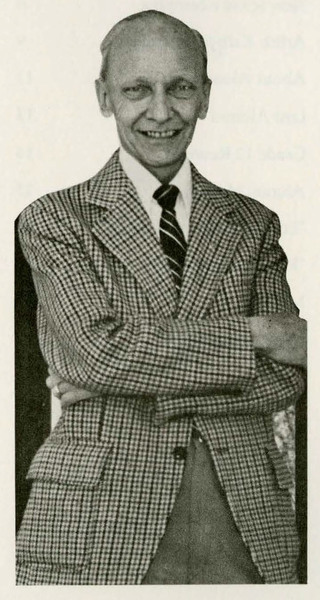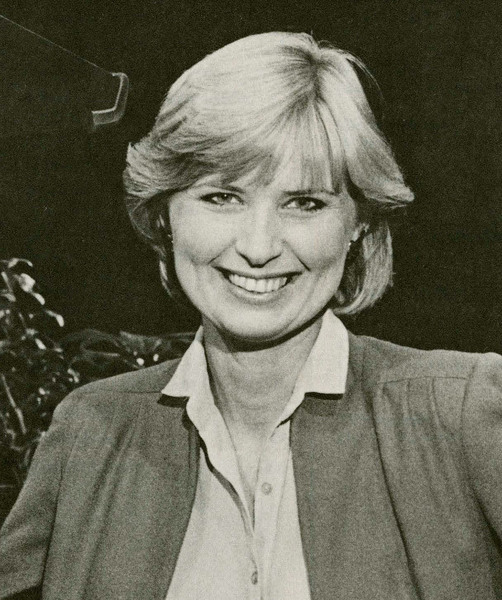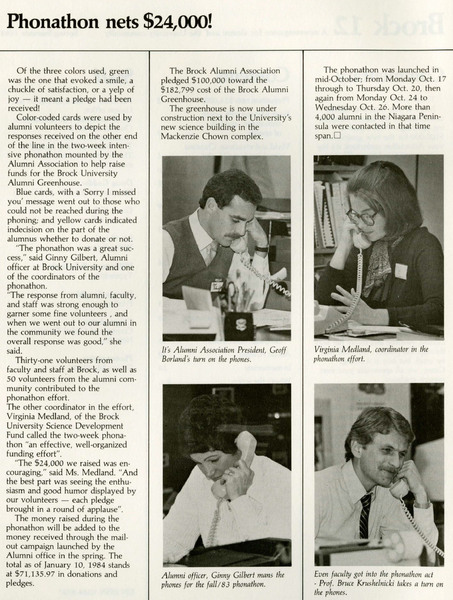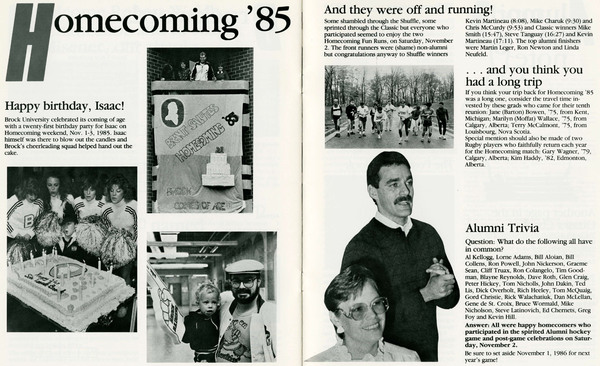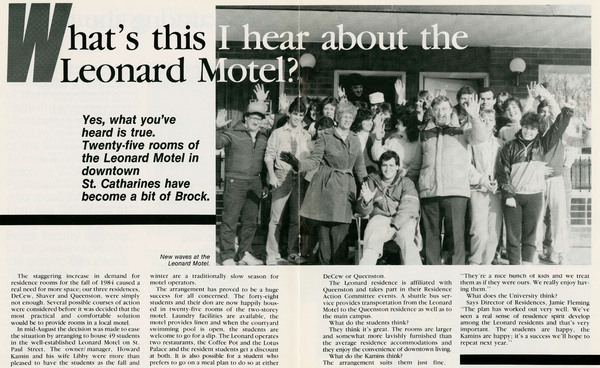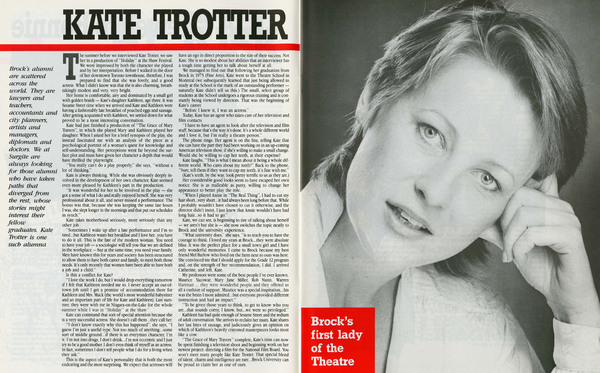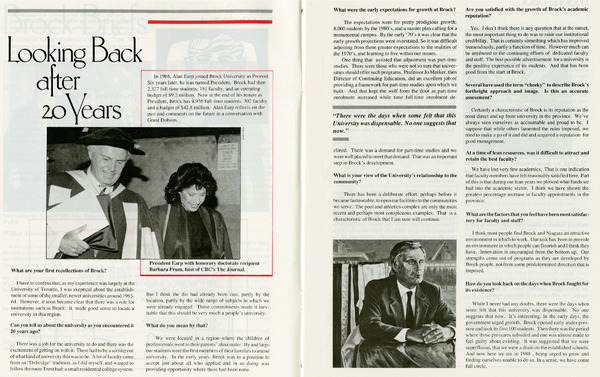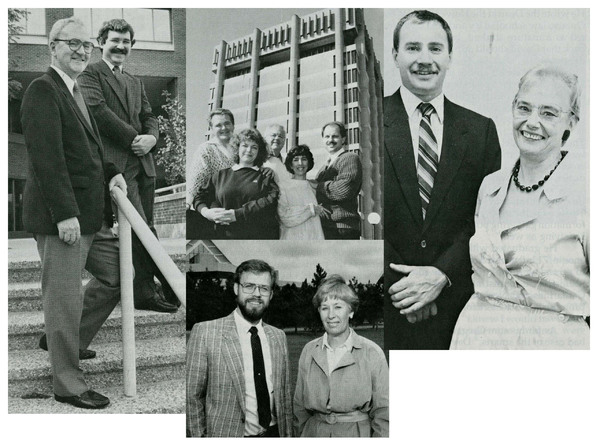Brock Becomes Surgite
Brock's alumni magazine begins a new decade and with that brings change. After twelve published issues of Brock (from 1977-1984), the name is changed to Surgite (Latin for "rise" or "push on") in 1985. The first issue of the decade includes an extensive article about Dr. Cecil Shaver as he completes his second three year term as Brock University Chancellor. This first issue of the 1980s also exhibits a much more prominent fundraising effort for the Alumni Fund with the use of a headline "The bucks start here". The goal was to fundraise at least ten dollars per donation.
The 80's also brought a new Chancellor, Ralph Misener, and the retirement of one of Brock University's founding fathers, Mackenzie Chown, after 22 years on the Board of Trustees. Another man at the foundation of Brock University's start is Ray Woodfield who was hired in 1962 as director of physical plant. In the Spring/Summer 1982 edition of the Brock alumni publication, Woodfield is featured in an article about his time spent working at Brock University from his early days at the Glenridge campus to his days before retirement at the top of the escarpment.
As the decade progressed, there were opportunities to interview alumni who had made it to the forefront of their fields. For example, in the Spring/Summer issue of 1984, Christina Pochmursky was interviewed. Christina, a student at Brock University beginning in 1966, was an English major. She was part of one of the first classes to attend the University and she recalls being one of only a handful of students in some of her classes. After graduation, Christina pursued further education that transferred into jobs in reception, then research assistant roles, and finally an on air journalist. She began reporting on business topics, then covered Queen's Park and by the time of the article, was a special assignment reporter.
In the Spring/Summer edition of 1985, the Alumni Association revealed their outstanding fundraising efforts. It was in November 1984 that they officially opened the Alumni Greenhouse that was the result of a $100,000 contribution from their fundraising work. The strategies to reach their goal included mailing out information cards with donation options, then when they had not met their goal, a phonathon was held which exceeded the amount needed. In a matter of eighteen months, the Alumni Association had started their campaign and obtained the necessary funds for the project.
The traditional Homecoming celebration of 1985 included a special 21st birthday party for Brock University. Also included in the events were a couple of fun runs, reunions from across the country and beyond, and an alumni hockey game. The events over the weekend of November 1-3 are captured in a series of photographs featured in the Fall/Winter 1985 edition of the Surgite publication.
In the Spring/Summer editon of 1985, it was apparent that Brock University had expanded to the point of exhausting the options for on campus residence and had reached capacity at their Queenston location. The Leonard Motel on St. Paul street in downtown St. Catharines became an overflow location for students to reside. The forty eight students filled twenty five rooms at the motel and were provided with shuttle and meal plan options once they were settled. The article describes the move to the motel as "...a huge success for all concerned."
A regular occurence in the publication is an article/interview about a Brock alumna who has made their mark in a particular industry. In the Spring/Summer 1987 edition, Kate Trotter is featured. Trotter graduated from Brock University with a Fine Arts degree in 1975 and following that, attended a prestigious theatre school in Montreal. It was not long before Trotter considered herself a working actress, securing roles in plays, film and television. After many outstanding accomplishments as an actress, Kate Trotter mentions that she plans to direct a film for the National Film Board.
The Surgite issue of Summer 1988 spotlighted the 20 years Alan Earp was part of the Brock University administration as he completed his tenure as President. Earp began his time with Brock back in 1968 as Provost and six years later was named President. He watched the University grow and evolve over two decades and in his interview with the Alumni Office, he speculates about the future of Brock. Earp remarks, "There were the days when some felt that this university was dispensible. No one suggests that now." He continues further in the interview, "I'm quite sure that 40 years down the line Brock will be a full-service university. We have built an excellent base and when new professional schools are needed, Brock has positioned itself as an appropriate candidate for consideration."
In the Winter 1988 issue of Surgite, we are introduced to several two-generation Brock graduate families. The featured families include: the Fasts, the Oakes, the Crundwells, and the Holders. Angie Fast is the first graduate mentioned. She was a mother of five children when she began her studies in 1967 and completed two degrees at Brock. Her son David was encouraged by his mother's dedication and inspired him to also enroll. It was 1982 when he graduated with a double major in geography and urban and environmental studies.
David and Gregory Oakes are another two-generation family of Brock graduates. David, a father of three children, worked full time as a County Bailiff when he began his studies in 1968. He later graduated with a degree in Political Science in 1971. David's son Gregory was on the forefront of emerging technology in high school and found himself drawn to the computer science program at Brock. Gregory was the first to graduate with a Bachelor of Computer Science when he completed his studies in 1978.
Mary Crundwell began her studies the year that Brock University opened, in 1964. She was a mother of a nine year old boy and worked nights and summers to complete her degree in Economics. Her son, Randy, followed in his mother's footsteps and completed a BA majoring in Business in 1986.
Finally, the Holders achieved eight degrees among five members of the family. The patriarch of the family, Heinz, was working in construction. But with the support of his family, he went back to school to become a teacher. He completed his degree in 1969 and began a 25 year career in teaching. His children and their spouses were inspired by Heinz and several decided to follow the same path by graduating from Brock University.

